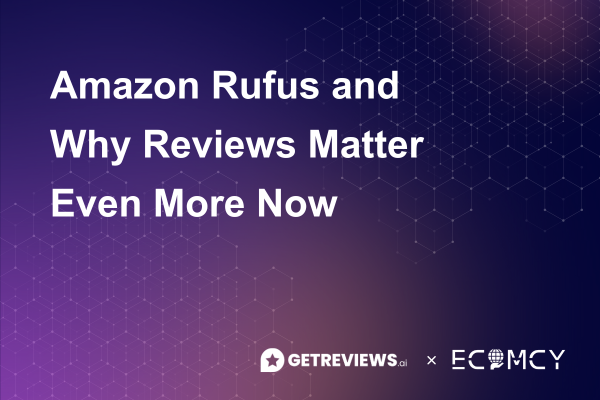October 30, 2025

In 2024, Amazon rolled out one of its most powerful generative AI capabilities, Rufus. Amazon Rufus is a generative AI shopping assistant designed to reshape how shoppers discover and buy products.
For Amazon sellers, it’s a game-changer, because Rufus doesn’t just read your listings; it reads your reviews. And in the age of AI-powered shopping, even with the recent launch of Shopify and ChatGPT, what your customers say about you matters more than ever before.
Launched in February 2024 as a beta and expanded to all U.S. shoppers. Amazon Rufus is an AI-driven conversational shopping assistant built directly into the Amazon app and website.
Instead of typing keywords like “wireless earbuds” in the search bar, shoppers can now ask Rufus natural-language and even more detailed questions, such as:
Rufus will then deliver a summarized, conversational answer and suggest top products that fit the shopper’s needs.
It’s like having a friend who’s an expert in what you’re looking for and knows all the information, products, and reviews that are on Amazon.

Rufus is powered by large language models (LLMs) - the same core technology behind ChatGPT - but fine-tuned specifically for Amazon. It operates by:
1. Data training: Rufus is trained on Amazon’s massive catalog of product listings, verified purchase reviews, Q&A threads, and other contextual web data.
2. Context recognition: When a shopper asks a question, Rufus identifies the intent (“best for noise-cancelling”) and pulls insights from reviews and listings that match.
3. Conversational summary: It then generates a natural-language response highlighting product pros, cons, and differentiating features - citing what real customers have said.
4. Continuous learning: And the most important - Rufus improves as it gathers more data from customer interactions and feedback.
Rufus helps understand why someone is shopping, not just what they’re searching for.
Rufus doesn’t just display reviews - it learns from them. Every word of feedback, sentiment, and rating now directly shapes how your product is presented to shoppers on Amazon.
1. Reviews Teach Rufus What Your Product is About
Your listing might say “lightweight, durable, and portable,” but Rufus prioritizes what customers say. If multiple people write “great for travel” or “warm for outdoors”, Rufus associates your product with those contexts and recommends it to shoppers with similar needs.

Generic reviews like “nice quality” won’t help much. Detailed feedback, such as “I wore this jacket on a weeklong camping trip and it kept me warm in the evening,” tells the AI exactly what kind of buyer to recommend it to.
2. Star Ratings Influence Visibility
Rufus uses star ratings as a signal. When summarizing recommendations, it tends to feature products with high average ratings and consistent positive sentiment. That means products with a high star rating volume and quality reviews are more likely to surface in the responses presented by Rufus.
3. Negative Reviews Matter Too
Rufus doesn’t hide weaknesses - it also summarizes them. If reviewers say “the fit runs small” or “short battery life”, that feedback becomes part of Rufus’s answer to shoppers.
Proactively address negative feedback and improve listings to clarify expectations to help keep Rufus’s summaries true and accurate.
4. Keep the Feedback Loop Fresh
Rufus continually learns from fresh data. So new reviews don’t just influence future shoppers - they help re-train the AI in real time. Products that consistently earn detailed, positive reviews can quickly gain visibility.
Here’s how to adapt your review strategy for Rufus:
1. Encourage Detailed, Descriptive reviews
Prompt buyers to share their honest feedback such as how they used the item and what problem it solved for. These details feed Rufus’s understanding and make your product more discoverable.
2. Focus on Verified Reviews
Rufus relies heavily on verified-purchase reviews for credibility. Prioritize collecting authentic feedback post-purchase using tools like GetReviews.ai, which helps sellers collect more verified reviews from customers via package inserts, QR codes, and surveys.
3. Monitor Any Trends
Track common keywords and sentiments from your reviews. If customers keep mentioning “great packaging”, that’s what Rufus will learn. Use those insights to adjust your messaging, product listings, or operations.
Amazon Rufus is a turning point for sellers, as there’s a bigger emphasis on AI-driven conversations with customers, rather than a simple product listing. It’s time for reviews to be your advantage and why your products deserve to be recommended.
Comments will be approved before showing up.

WANT TO STAY AHEAD OF THE COMPETITION ?
Subscribe to stay on top of the best strategies in the field of Amazon & Walmart